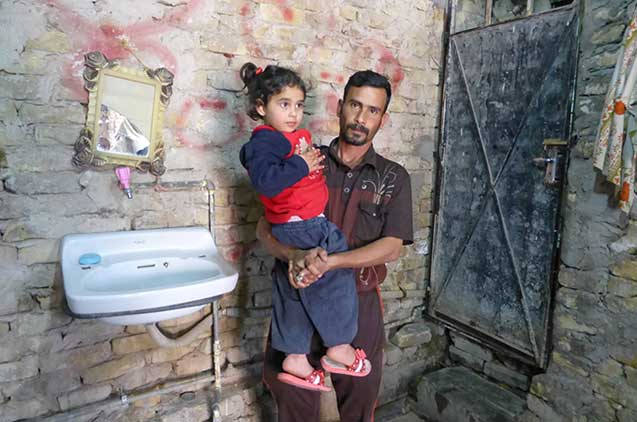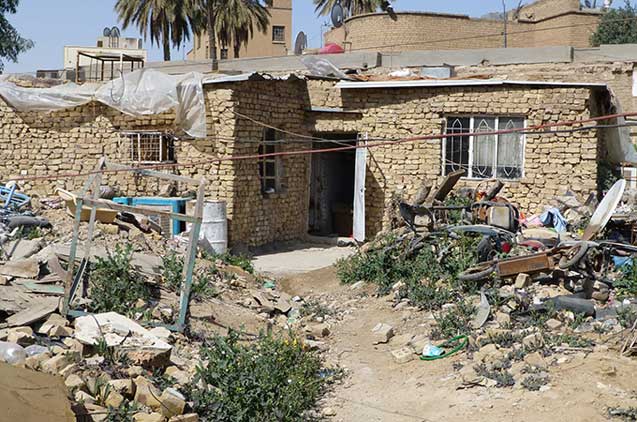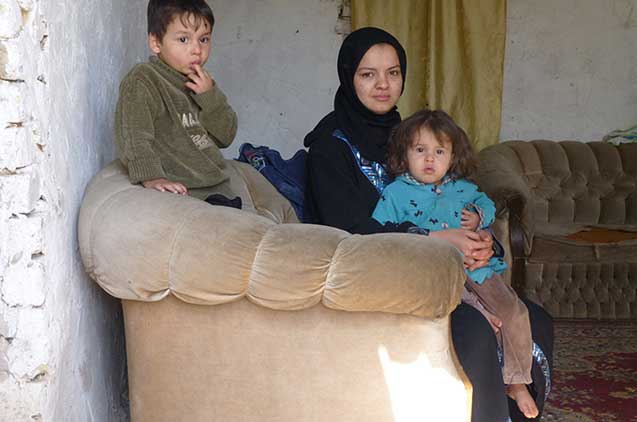
Baghdad – The first thing Haifa Abdul Majid did after being told I wanted to speak with her about her experience as a refugee in her own country was to, incredibly, express her gratitude for the fact that she has food.
“First I thank God because we are finding some food and can eat, unlike many other countries where people cannot even find food,” the 55-year-old grandmother said while holding her arms to the sky in thanks.
But the reality of her situation was quickly evidenced by her inability to offer the usual large repertoire of sweets, cookies, and other welcoming treats for guests, as is the usual custom in Iraq.
Instead of the aforementioned, she offered a glass of water.
Also See: Iraq: War’s Legacy of Cancer
Haifa has been living as a refugee in a corner of the Adhamiyah district of Baghdad, a stone’s throw from the Tigris River, since 2007 when she fled increasing sectarian violence in her native Nahrawan town.
And according to current figures from Iraq’s Ministry of Migration and Displacement (MoMD), she is only one of 1.1 million other Internally Displaced Persons (IDPs) in Iraq today.
Persistent problem
UNHCR estimates provided to Al Jazeera by Jessica Hyba, the Public Information and External Relations Officer in Iraq show that the greatest number of IDP’s to be in the Baghdad governorate, and puts the number at 200,000 Iraqis.
Dahfer Hamid, an unemployed construction worker who is married with three young children, lives in an abandoned lot in Baghdad where he has constructed a make-shift home from bricks, pieces of wood, and metal that he has collected.
The smell of raw sewage wafts in from outside into his dwelling. Piles of garbage swarming with flies surround where he lives, along with rusting car frames, old refrigerators, and scrawny chickens scavenging for food.
Like Haifa, Dahfer fled his town during the horrendous sectarian violence of 2007 that wracked Iraq, and came to Baghdad.
“We lived in a mixed area of both Sunni and Shia, but the Mehdi Army [Shia Cleric Muqtada al-Sadr’s militia] started killed Sunnis in our area,” he explained to Al Jazeera. “My neighbours were killed, and after they knocked on my door to ask if I was Sunni or Shia, I told them I was from the area and they left.”
 Hundreds of families, like those of Dahfer Hamid’s, are living in areas of Baghdad that most would consider unliveable, due to having fled sectarian violence in 2006-2007. (Photo: Dahr Jamail / Al Jazeera)
Hundreds of families, like those of Dahfer Hamid’s, are living in areas of Baghdad that most would consider unliveable, due to having fled sectarian violence in 2006-2007. (Photo: Dahr Jamail / Al Jazeera)
Fearing for his life, Dahfer fled the same day, after watching militiamen kill a local Imam.
Iraq’s Ministry of Manufacturing owns the land where he now lives, and periodically sends someone to tell them to leave.
But Dahfer, along with hundreds of other families in the area, have no place else to go.
“I feel bad, I don’t know what to do,” he explained. “I’m Sunni and can’t live outside of a Sunni area of Baghdad. I can’t rent, I don’t have enough money, only this house, where four families are living now.”
Haifa and Dahfer are residual refugees within their own country, a product of the massive sectarian violence from 2006-2007, a period that saw as many as 100,000 Iraqis fleeing to Syria and Jordan each month.
US military operations that destroyed large areas of cities and towns where they took place also generated high numbers of refugees.
By the middle of 2007, UNHCR estimated that more than 4.2 million Iraqis were displaced, 2 million within Iraq and more than 2.2 million in neighbouring countries.
Current UNHCR figures given to Al Jazeera place the number of Iraqis registered and remaining in Syria at 63,000, with another 25,000 in Jordan.
This writer knows of several Iraqis who had fled to Syria during the height of Iraq’s sectarian violence, who then had to flee Damascus when violence began in that country, and seek refuge in Lebanon.
Currently, there are no official figures on how many Iraqis have had to do this for their safety.
While many Iraqis who fled the country have returned, IDP’s in Iraq are not getting much support from the government of Prime Minister Nouri al-Maliki, and life for many of them remains a matter of daily survival.
Who cares?
Dahfer, like so many IDP’s Al Jazeera interviewed, believes if he returned to his hometown he would be killed.
“Some of the people living here returned home and were killed,” he said, before adding that his uncle and two of his other friends returned and all of them were killed.
When asked what the Iraqi government was doing to assist them and other refugees, Dahfer was blunt.
“All of Iraq is destroyed, and Maliki doesn’t care,” he said while holding up his arms, “So why would he care about us?”
 IDPs live in makeshift houses that offer little protection from the often extreme temperatures of Baghdad. (Photo: Dahr Jamail / Al Jazeera)
IDPs live in makeshift houses that offer little protection from the often extreme temperatures of Baghdad. (Photo: Dahr Jamail / Al Jazeera)
Marwa Ali, a 20-year-old mother of two, is another refugee in Baghdad. She, her husband, and their two-year-old daughter and four-year-old son live in a makeshift dwelling surrounded by piles of garbage almost as high as their tin roof.
Marwa told Al Jazeera stories of what life was like for them living in such conditions.
“In the winter the rain comes down through the ceiling,” she said while pointing up to rusted pieces of tin set upon old boards over our heads. “And of course there is no heat to keep us warm in the winter.”
 Tens of thousands of Iraqi children are being born into areas where they begin a life of homelessness, poverty, and insecurity. (Photo: Dahr Jamail / Al Jazeera)
Tens of thousands of Iraqi children are being born into areas where they begin a life of homelessness, poverty, and insecurity. (Photo: Dahr Jamail / Al Jazeera)
It had been three days since they had had any clean water, and in the summer, their tin ceiling acts like a heater.
“Flies and mosquitos are always with us, along with scorpions,” she explained wearily.
When asked what she hoped would happen with her family, Marwa looked down at the ground for several moments before answering.
“We have no future, and neither does Iraq have a future. My children have no future. We are only living day by day.”
Haifa, when asked about what she hoped would happen with her country, shook her head before answering.
“We know we are in this bad situation because of the US occupation, and our problems with this government are the result of that time,” she replied, before talking about the future of her grandson.
“I ask God to take me away before he grows up, because I don’t want to see what it will be like by then, since it only grows worse for us day by day now.”
She paused, looked off into the distance, then looked at the ground before adding, “I’m an old woman and I don’t care if I die, but what about these young children?”
4 Days Left: All gifts to Truthout now matched!
From now until the end of the year, all donations to Truthout will be matched dollar for dollar up to $44,000! Thanks to a generous supporter, your one-time gift today will be matched immediately. As well, your monthly donation will be matched for the whole first year, doubling your impact.
We have just 4 days left to raise $44,000 and receive the full match.
This matching gift comes at a critical time. As Trump attempts to silence dissenting voices and oppositional nonprofits, reader support is our best defense against the right-wing agenda.
Help Truthout confront Trump’s fascism in 2026, and have your donation matched now!